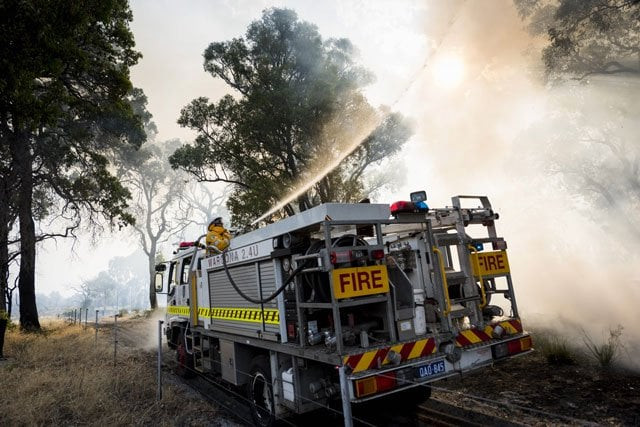Two dead as firefighters battle huge Australia bushfire
Western Australia Police say bodies are believed to be those of two missing men aged 73 and 77

This handout photo taken on January 7, 2016 and released by the Department of Fire and Emergency Services (DFES) shows firemen tackling a bushfire burning near Waroona, some 110 kilometres south of Perth. PHOTO: AFP
The inferno — which has razed about 71,000 hectares (175,000 acres) in Western Australia state — is the most recent in a series of bushfires that have kicked off a hot summer season, with the latest deaths lifting the national toll to eight.
The two bodies were found in burnt-out houses in Yarloop, a historic mill town some 110 kilometres (70 miles) south of Perth that has been devastated by the bushfire — one of the worst to hit the region in recent years.
The bodies are believed to be those of two missing men aged 73 and 77, Western Australia Police told AFP. "It's just another day of catastrophe, isn't it?" local shire president Tania Jackson told the Australian Broadcasting Corporation after news of the men's deaths. "Each day that has gone by seems to bring worse news. It's devastating."
The bushfire — which is entering its fifth day after reportedly being started by a lightning strike — has destroyed 143 properties including 128 homes in Yarloop, the state's Department of Fire and Emergency Services (DFES) told AFP.
The blaze has a perimeter of about 226 kilometres and has yet to be contained, but the 250 firefighters battling the flames were hoping to take advantage of the cooler weather on Sunday.
"Overnight and today, favourable conditions came in and it's a lot cooler here today and that has allowed firefighters to gain more ground on the fire and to increase containment lines," a DFES spokesperson told AFP.
DFES said several towns in the region remained under threat. "Unless you are ready and prepared to actively defend your property, evacuate to the south via the South Western Highway if safe to do so," it said in an emergency warning. "The fire remains uncontained and is not yet controlled."
Western Australia's Premier Colin Barnett said the event had been declared a natural disaster, a measure that gives residents access to greater financial support, adding that the "damage bill is going to be very significant".
Yarloop residents spoke of how the bushfire tore through their town in just seven minutes, as aerial footage showed blackened ground, burnt-out shells of vehicles and houses reduced to brick fireplaces.
"During the day, the hills were very dark and smoking," dairy farmer Joe Angi told the ABC on Saturday. "But the wind picked up just on dark and she's just come down from the hills, straight down, flat out. It was tumbling over itself like a wave of fire."
Bushfires are common in Australia's hotter months, with four deaths in Western Australia last November. Another two people perished in neighbouring South Australia state in the same month.
DFES commissioner Wayne Gregson warned that the worst of the bushfire season was yet to come. "There is still another 10 or more weeks to go in what is predicted to be a difficult bushfire season," Gregson told Perth's The Sunday Times.
"Late January to early February is traditionally the most intense summer period, when we can experience hot weather with dry winds and seasonal lightning."
Australia's worst firestorm in recent years devastated parts of the southern state of Victoria in 2009, destroying thousands of homes and killing 173 people.



















COMMENTS
Comments are moderated and generally will be posted if they are on-topic and not abusive.
For more information, please see our Comments FAQ